December 2017
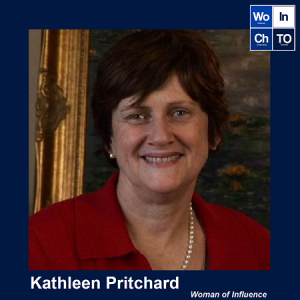
Kathleen Pritchard (? – Present)
Kathleen Pritchard is the current head of oncology at Toronto’s Sunnybrook Health Sciences Centre. Pritchard’s pioneering research focuses on clinical outcomes for patients with breast cancer, including development of individualized therapies and combination treatments. Work stemming from her clinical trials include novel approaches to adjuvant therapy, hormone therapy, and localized targeting of tumours leading to increased disease-free survival rates in patients. Pritchard began her education at Queen’s University in Kingston where she earned both her Bachelor of Science degree and medical degree, and completed her practicum at Toronto Western and Toronto General Hospitals. Pritchard then joined the University of Toronto as a research fellow. Pritchard was a founding member of both the Canadian Oncology Society in 1978 and the Canadian Association of Medical Oncology in 1988. Pritchard served as the Chair of the NCIC Clinical Trials Group Breast Cancer Site Committee from 1994-2005. Her other appointments include director of the Ontario Clinical Oncology Group and Professor in the departments of medicine and public health sciences at the University of Toronto. According to Thompson Reuters, Pritchard was one of the most highly cited researchers in the world in the years 2014 and 2015. Her honours include the O. Harold Warwick Prize given by the Canadian Cancer Society in 2005, and the 14th Women of Action awards luncheon Scientific Honoree in 2015. Her continued devotion to women’s health and recognition as one of Canada’s dominant academic physicians makes Pritchard our choice for this month’s Women of Influence.
November 2017
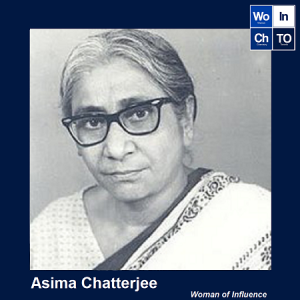
Asima Chatterjee (1917 – 2006)
Asima Chatterjee, born September 23, 1917, was an Indian organic chemist well known for her work in the fields of medicinal chemistry and phytomedicine. Her most notable work focused on researching vinca alkaloids (used in chemotherapy to slow down cancer cell duplication), and the development of both anti-epileptic and anti-malarial drugs. She was the first woman to receive a Doctorate of Science from an Indian university. Despite resistance, Chatterjee completed her undergraduate degree in organic chemistry and went on to win many honours including India’s most prestigious science award in 1961, the annual Shanti Swarup Bhatnagar Prize for her achievements in phytomedicine. It would be another 14 years before another woman would be awarded it again. A prodigious writer, she published around 400 papers in national and international journals as well as many review articles. She was elected as the General President of the Indian Science Congress Association in 1975 – in fact, she was the first woman scientist to be elected to the organization. Regrettably, she passed away on November 22, 2006. Her philosophy in life was imbibed with a strong work ethic. “I wish to work as long as I live,” she said. Her legacy lives on in young females aspiring to higher education. She was featured this year by Google’s Doodle in honor of her 100th birthday.
October 2017
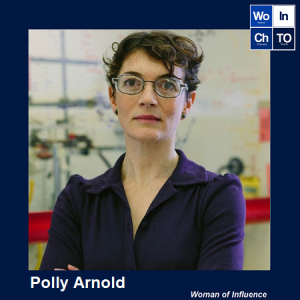
Polly Arnold (1972 – Present)
Prof. Polly Arnold knew from a young age that she did not want to work at a desk job. During her undergraduate research project at the University of Oxford, she found the problem solving, skillfulness and creativity demands of synthetic chemistry to be thrilling. She decided to continue her studies as a graduate student at University of Oxford under the supervision of Prof. F. Geoff N. Cloke and later went on to do postdoctoral research as a Fulbright Scholar at MIT with Prof. Kit C. Cummins. Currently, Prof. Arnold is the Crum Brown Chair of Chemistry at the University of Edinburgh where her research focuses on putting the ‘f’ in chemistry by exploring the synthetic chemistry of f-block elements of the periodic table. For her research, she has won numerous prizes and awards, including the 2015 Seaborg Lectureship (University of California Berkeley, USA) and the 2012 Corday-Morgan Prize from the Royal Society of Chemistry. Prof. Arnold is extremely involved in the chemistry community by advocating for gender diversity in chemistry. She believes that there are four action points to close the gender disparity gap: (1) monitor numbers of women in STEM, (2) mentor women and make sure they are applying, (3) create a workplace that supports everyone and allows flexibility, and (4) reclaim the meaning of feminism. In 2012, she produced an impactful short film and accompanying book entitled “A Chemical Imbalance” which asks why Edinburgh has such a long history of successful female chemists, and why women are still under-represented in all science fields. This year, Prof. Arnold formed Sci Sisters, a new network designed to support women in STEM fields who find themselves isolated in senior positions. She was also appointed as an Officer of the Order of the British Empire for her exceptional contributions to chemistry and to women in STEM.
September 2017
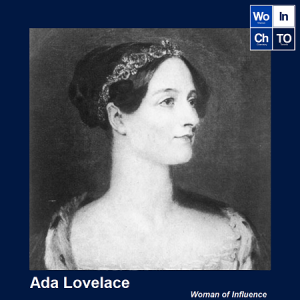
Ada Lovelace (Augusta Ada King-Noel, née Byron, Countess of Lovelace) (1815 – 1852)
Ada Lovelace was a mathematician and writer born in London, England in 1815 to famed poet Lord Byron. Throughout her youth, Ada’s mother, Annabella, encouraged her mathematical abilities, and hired several scientists, such as Mary Somerville, to tutor her in science and math. As a teenager, Lovelace became acquainted with Charles Babbage, a prominent mathematician who invented the ‘Difference Engine’, a mechanical calculating machine designed to tabulate polynomial functions. Ada and Charles became close friends, and corresponded about mathematics for years. Ada became fascinated with Babbage’s plans to build a second machine, known as the ‘Analytical Engine’, a general-purpose computer, and was asked to translate an article on the subject for a journal. Ada’s enduring fame stems from a set of notes she appended to this translated article, which delved much deeper into the potential of this machine. She explained its ability to not only crunch numbers, but to be programmed to solve problems of any complexity. Ada anticipated the implications of modern computing long before they were realized, and for this, is often considered to be the first computer programmer.
August 2017
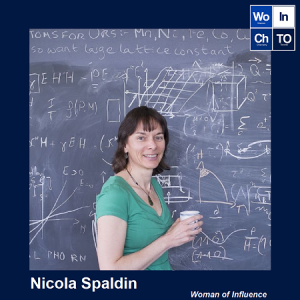
Nicola Spaldin (née Hill) (1969 – Present)
Nicola Spaldin was born in Sunderland, England in 1969 and obtained her BA in Natural Sciences at the University of Cambridge in 1991, after which she obtained a PhD in Chemistry from UC Berkeley in 1996. From 1996 to 1997, she took part in a postdoctoral fellowship at Yale University, studying ferrroelectrics. Afterward, she joined the Materials Department at University of California, Santa Barbara as Assistant, Associate, and then Full Professor. In 2010, she was offered a position as Materials Chair at ETH Zurich, where she currently teaches materials theory courses and conducts research on multiferroics, a field which she pioneered in 2000 when she published a seminal article on these rare, elusive materials. Multiferroic materials simultaneously possess ferromagnetism and ferroelectricity, and have the potential to revolutionize modern technology by combining data processing capabilities with memory storage. For her pioneering work in this emerging field, she has received the American Physical Society’s McGroddy Prize for Materials, the Körber European Science Prize and the L’Oréal-UNESCO For Women in Science Award, among other honors. She is also the author of a popular text book on Magnetic Materials. In her spare time, Prof. Spaldin plays clarinet for the Bronze Clarinet Trio in Zurich.
July 2017
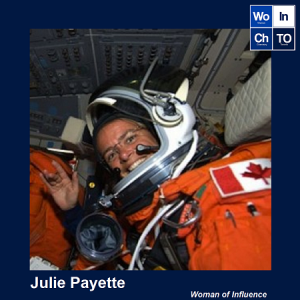
Julie Payette (1963 – Present)
Julie Payette is a former astronaut and engineer. She was the first Canadian to board the International Space Station, the country’s 2nd woman in space, and will be the 29th Governor General of Canada.
Payette was born in Montreal, QC, and later went abroad to complete an IB diploma at Atlantic College in Wales, UK, on one of six scholarships awarded to Canadians. Payette wanted to be astronaut from a young age, and was even challenged during her scholarship interview about her goal to be an astronaut – a goal considered incredibly ambitious for any Canadian at the time, let alone a female Canadian. Payette persevered, and went on to graduate with a BEng in Electrical Engineering from McGill, then a MASc in Computer Engineering from University of Toronto. She then worked as an engineer, researching computer systems, language processing, and speech recognition with IBM and BNR/Nortel. In 1992, she was selected by the Canadian Space Agency to become one of four astronauts. She completed two spaceflights, where she was Mission Specialist and operated the Canadarm during the Discovery mission that delivered 4 tons of supplies to the International Space Station. In her second spaceflight, Payette was the Flight Engineer and operated three different robotic arms on the Endeavour mission that completed the Kibo Japanese Experiment Module. She became Chief Astronaut for the Canadian Space Agency, and has also served with NASA as Capsule Communicator at the Mission Control Center in Houston.
Payette has received a vast number of awards and honours, including 17 honorary degrees, two NASA Space Flight Medals, the NASA Exceptional Service Medal, the Queen Elizabeth II Diamond Jubilee Medal, the Engineers Canada Gold Medal, appointments of Knight of l’Ordre National du Québec and Officer of the Order of Canada, and induction into the Canadian Aviation Hall of Fame. She is also a serious athlete and is actively involved in sports, having carried the Olympic flag in the opening ceremonies for the 2010 Winter Olympics, and serving on boards for Canada’s Own the Podium Olympic program and the International Olympic Committee Women in Sports Commission. In addition, Payette is a talented pianist and vocalist, and has performed with various orchestras.
June 2017
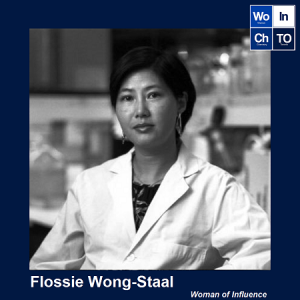
Flossie Wong-Staal (1947 – Present)
Flossie Wong-Staal was born in Guangzhou, China, and emigrated to Hong Kong in the late 1940s following the Communist revolution. She excelled in science from a young age and was encouraged by her teachers to pursue studies in the United States. Her father named her “Flossie” after a powerful storm that traveled through their region.
Wong-Staal attended UCLA where she pursued a BS in bacteriology, after which she completed her PhD in molecular biology. She did postdoctoral research at UCSD, after which she worked at the National Cancer Institute with Robert Gallo, pursuing research on retroviruses.
In 1983, Wong-Staal, Gallo, and her team of NCI scientists identified HIV as the cause of AIDS (simultaneously with Luc Montagnier). Two years later, she was the first person to clone HIV and complete the genetic mapping of the virus – making it possible to develop HIV tests! Wong-Staal and her team are also responsible for developing new treatments for HIV/AIDS patients suffering from dangerous Kaposi’s Sarcoma lesions by studying the effects of the tat protein (found within the viral strain HIV-1) on the growth of cells found within these KS lesions.
In 1990, Wong-Staal moved from NCI to UCSD where she continued her research into HIV/AIDS. She was named chairman of UCSD’s Center for AIDS Research in 1994, and was also elected into the Institute of Medicine of the U.S. National Academies that same year. She developed a protocol during this time that centred around using a ribozyme “molecular knife” to repress HIV in stem cells, which was the second to be funded by the United States government.
Flossie Wong-Staal retired from UCSD in 2002 and now holds the title of Professor Emerita. She has since co-founded iTherX (first called Immusol), a biopharmaceutical company, and acts as Chief Scientific Officer. In 2002, Discover named her as one of the fifty most extraordinary female scientists, and in 2007 the Daily Telegraph heralded her as #32 of the “Top 100 Living Geniuses”.
May 2017
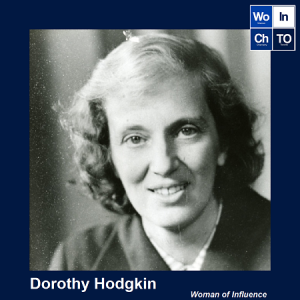
Dorothy Hodgkin (1910 – 1994)
Dorothy Hodgkin was a British chemist and is regarded as a pioneer scientist in the field of X-ray crystallography for the study of biological molecules. Specifically, she is known for her elucidation of the protein structure of insulin, vitamin B12 and penicillin, for which she became the third woman to win the Nobel Prize in Chemistry. Dorothy Hodgkin first developed her interest in chemistry and crystals near the age of 10, and she became one of two girls who were allowed to study chemistry with the boys. At the age of 18, Dorothy attended Oxford’s women’s colleges to further her study in chemistry, where she became the third woman to achieve a first class honors degree before moving to Cambridge to study X-ray crystallography. She later returned to Oxford in 1934 where she spent her career teaching chemistry and advancing X-ray crystallography techniques. Among her many achievements, she was also elected a Fellow of the Royal Society in 1947, a foreign member of the Royal Netherlands Academy of Sciences in 1956 and a foreign honorary member of the American Academy of Arts and Sciences in 1958. Additionally, she was awarded the Lomonsov Medal of the Soviet Academy of Sciences and the Lenin Peace Prize from the Soviet government.
April 2017
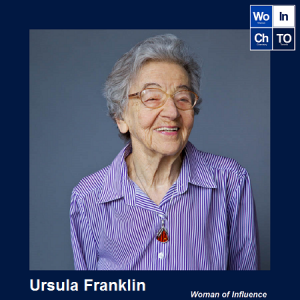
Ursula Franklin (19521 – 2016)
Professor Ursula Franklin was a Canadian-German physicist and metallurgist at the University of Toronto. She was a pioneer in the field of archaeometry, where she applied the concepts and techniques of modern materials science to date copper, bronze, and ceramic artifacts. In one of her most impactful studies, she investigated the levels of strontium-90 in baby teeth to evaluate the effects of nuclear weapons testing on public health. The results of this study contributed to the cessation of above ground nuclear weapons testing.
Professor Franklin was born in Munich on September 16, 1921. She studied chemistry and physics at Berlin University until the onset of the Second World War. During the war, she was expelled from the university by the Nazis and interned in a forced labour camp. After the war, she continued her education and received her Ph.D. in experimental physics from Berlin Technical University in 1948. She came to the University of Toronto in 1949 as a post-doctoral fellow and eventually became a professor in the Department of Metallurgy and Materials Science in 1967. In 1984, she became the first woman at the University of Toronto to be designated a University Professor, which is the university’s highest honour.
Outside of her scientific work, Professor Franklin is also well known for her activism. She has written extensively on feminism, social justice, pacifism, education, and the effects of technology on society. She was actively involved in Canadian Voice of Women for Peace, which is a leading anti-war organization founded in the 1960s. Professor Franklin passed away on September 16, 2016, at the age of 94. Ursula Franklin Academy, a high school in Toronto’s west end, was named in her honour.
March 2017
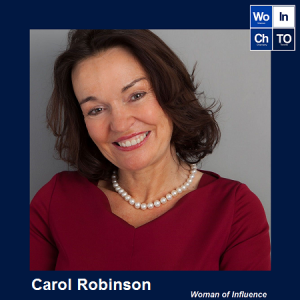
Carol Robinson (1956 – Present)
Carol V. Robinson, DBE, FRS, FMedSci is widely renowned for pioneering the application of mass spectrometry to elucidate 3D structures of proteins. After completing her PhD at Churchill College in two years, she took an eight-year break to raise three children before returning to research at the University of Oxford as a post-doctoral fellow. In addition to becoming the first female Professor of Chemistry at the University of Oxford (1999), she was also the first female Professor of Chemistry at the University of Cambridge (2001). In 2009, she was elected Doctor Lee’s Professor of Chemistry at the University of Oxford, where her research group continues to investigate gas phase structures of biological molecules.
Throughout her career, Professor Robinson has been awarded the Biemann Medal by the American Society for Mass Spectrometry (2003), Fellow of the Royal Society (2004) and the L’Oreal-UNESCO for Women in Science Award (2015) among numerous other medals, awards, prizes and honorary titles. In 2013, she was named Dame Commander of the Order of the British Empire for her services to science.
Professor Robinson mentors younger women through the tenure process, and is an advocate for encouraging women to stay in science. Out of over 35 PhD graduates and 45 post-doctoral fellows that have been supervised by her, more than half were women.
February 2017
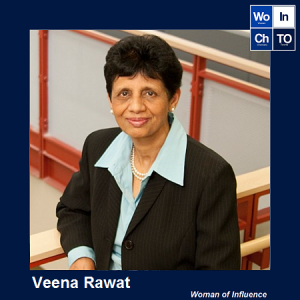
Veena Rawat (? – Present)
Veena Rawat immigrated to Canada from India in 1968 and she has been earning awards and setting records ever since. In 1973 she became the first woman to earn a PhD in electrical engineering from Queen’s University. Upon graduation she began working as an engineer for the Communications Ministry of the Canadian Federal Government. At her ministry position she quickly moved up the ranks to executive level positions. In 2003, she was the first woman chair for the World Radiocommunication (WRC) Conference of the United Nations. In 2004 she became the first woman president of the Communications Research Centre (CRC), a branch of Industry Canada, where she was responsible for over 400 employees. She remained in that position until 2011 when she adopted the role of Vice President and Ambassador for the International Telecommunications Union (ITU) affiliated with Research in Motion’s Advanced Technology Division.
Rawat has received numerous awards of recognition throughout her career including: Canada’s Leading Woman High Tech Entrepreneur, Canada’s Most Powerful Woman, Top 100 (2005), Canadian Woman of the Year in Communications (2004), Radio Advisory Board of Canada Award of Excellence (2004), International Telecommunications Union (ITU) Gold Medal (2003), and the Queen Elizabeth II Golden Jubilee Medal (2003).
More recently, Rawat was given the Public Service Award of Excellence (2011), and appointed Officer of the Order of Canada (2014) for her years of contributions to the telecommunications sector, and to women in leadership causes. She is also fluent in English, French, Hindi, and Spanish. To this day she remains an internationally recognized expert in wireless communication.
January 2017
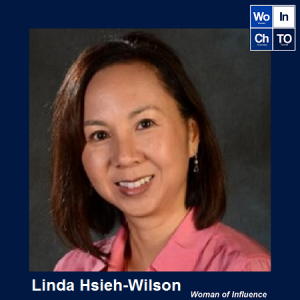
Linda Hsieh-Wilson (? – Present)
Linda Hsieh-Wilson is currently a Professor of Chemistry at California Institute of Technology and an investigator at the Howard Hughes Medical Institute. She obtained her Bachelor’s degree in chemistry at Yale University and obtained her PhD at University of California, Berkeley studying antibody-based catalysis with Prof. Peter G. Schultz in 1996. She continued her academic career with Nobel Laureate Paul Greengard at the Rockefeller University until 2000.
Hsieh-Wilson’s research bridges organic chemistry and neurobiology. She has made great strides in understanding important neuronal processes using chemical tools. More specifically, she has used a chemoenzymatic approach to label proteins to elucidate the effects of glycans on the structure and function of proteins. This innovative strategy allows us to probe and manipulate complex signalling pathways that control neuronal communication, learning, and memory. Her work has been awarded with a number of honors and distinctions including Beckman Young Investigators Award, Alfred P. Sloan Fellowship, Eli Lilly Award in Biological Chemistry, and Arthur C. Cope Scholar Award.
